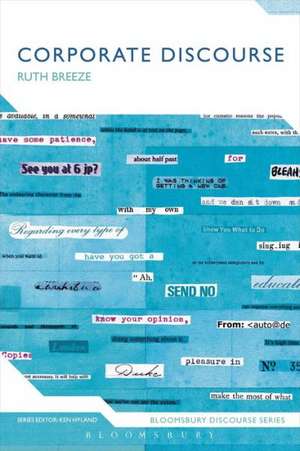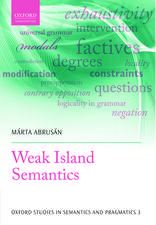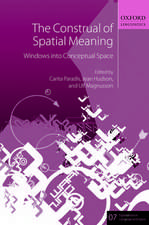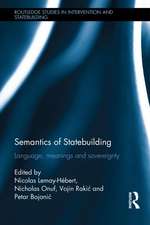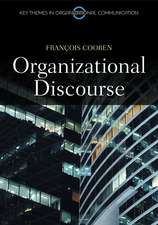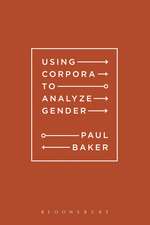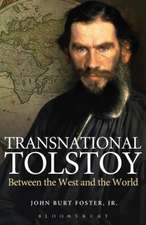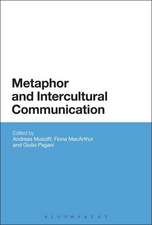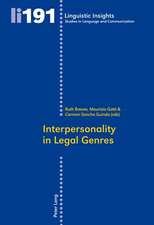Corporate Discourse: Bloomsbury Discourse
Autor Ruth Breezeen Limba Engleză Paperback – 25 feb 2015
| Toate formatele și edițiile | Preț | Express |
|---|---|---|
| Paperback (1) | 256.38 lei 6-8 săpt. | |
| Bloomsbury Publishing – 25 feb 2015 | 256.38 lei 6-8 săpt. | |
| Hardback (1) | 948.34 lei 6-8 săpt. | |
| Bloomsbury Publishing – 14 aug 2013 | 948.34 lei 6-8 săpt. |
Preț: 256.38 lei
Preț vechi: 294.81 lei
-13% Nou
Puncte Express: 385
Preț estimativ în valută:
49.06€ • 51.36$ • 40.59£
49.06€ • 51.36$ • 40.59£
Carte tipărită la comandă
Livrare economică 05-19 aprilie
Preluare comenzi: 021 569.72.76
Specificații
ISBN-13: 9781474222877
ISBN-10: 1474222870
Pagini: 224
Dimensiuni: 156 x 234 x 12 mm
Greutate: 0.31 kg
Editura: Bloomsbury Publishing
Colecția Bloomsbury Academic
Seria Bloomsbury Discourse
Locul publicării:London, United Kingdom
ISBN-10: 1474222870
Pagini: 224
Dimensiuni: 156 x 234 x 12 mm
Greutate: 0.31 kg
Editura: Bloomsbury Publishing
Colecția Bloomsbury Academic
Seria Bloomsbury Discourse
Locul publicării:London, United Kingdom
Caracteristici
Explains the key genres that shape and are shaped by corporate communication practices.
Notă biografică
Ruth Breeze is Head of the Institute of Modern Languages at the University of Navarra, Spain.
Cuprins
Introduction 1. The Corporation and its Stakeholders: Identity, Action, Interaction 2. Approaches to Corporate Discourse 3. Communicating with Employees 4. Communicating with Investors 5. Communicating with the World: Advertising Discourses 6. Communicating with the World: Websites, Reviews, Sponsorship 7. Interpreting Corporate Discourse Bibliography Index
Recenzii
Corporate Discourse offers a motivating introduction of different areas of business communication in today's world, and can be used as a starting point to explore some areas introduced by the author ... It is, no doubt, a comprehensive account of some discursive interactions in today's firms.
The author transcends the traditional, neutral envisaging of business genres and texts as the products of a discursive community to be mastered by newcomers ... In contrast she pushes us researchers and educators out of our comfort zone to tackle the analysis of those genres and texts as sets of social practices, which are not limited to those very genres and texts, but which include new complex realizations that are also conceived as part of the corporate discourse system, in all its complexity and power of reverberation and regeneration.
Using a range of analytical techniques to examine different forms of textual evidence from companies operating in many sectors, [Ruth Breeze] maps out current developments in corporate discourse against the complex background of globalization.
As an experienced ESP-teacher, Ruth Breeze manages to offer an excellent and broad introduction to corporate discourse, extremely useful for undergraduate students in business communication. Her review ofcontemporary research is up-to-date and well documented, offering an olympian point of view on most important contemporary approaches to corporate discourse. In her analyses of job ads, CEO-letters, advertising and web genres, she convincingly discusses recent trends in both the professional world and in academia.
Drawing on some of the most established discourse analytical frameworks, Ruth Breeze in Corporate Discourse offers a comprehensive, insightful, and critical account of some of the typical discursive actions of present-day corporations.
The author transcends the traditional, neutral envisaging of business genres and texts as the products of a discursive community to be mastered by newcomers ... In contrast she pushes us researchers and educators out of our comfort zone to tackle the analysis of those genres and texts as sets of social practices, which are not limited to those very genres and texts, but which include new complex realizations that are also conceived as part of the corporate discourse system, in all its complexity and power of reverberation and regeneration.
Using a range of analytical techniques to examine different forms of textual evidence from companies operating in many sectors, [Ruth Breeze] maps out current developments in corporate discourse against the complex background of globalization.
As an experienced ESP-teacher, Ruth Breeze manages to offer an excellent and broad introduction to corporate discourse, extremely useful for undergraduate students in business communication. Her review ofcontemporary research is up-to-date and well documented, offering an olympian point of view on most important contemporary approaches to corporate discourse. In her analyses of job ads, CEO-letters, advertising and web genres, she convincingly discusses recent trends in both the professional world and in academia.
Drawing on some of the most established discourse analytical frameworks, Ruth Breeze in Corporate Discourse offers a comprehensive, insightful, and critical account of some of the typical discursive actions of present-day corporations.
